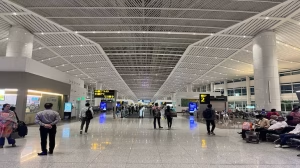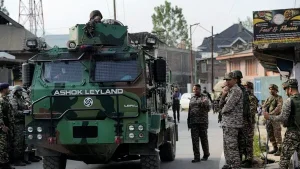New Delhi – In an unprecedented move, airports closed across India affected 25 facilities and led to over 300 flight cancellations following targeted missile strikes on terror camps in Pakistan and Pakistan-occupied Kashmir under Operation Sindoor. The military action, a response to the recent Pahalgam terror attack, has significantly disrupted air travel nationwide, particularly across northern and western regions as the nation implements emergency security protocols.
Major Airports Closed Across India as Security Measure

In the early hours of Wednesday, May 7, 2025, Indian aviation authorities implemented widespread airspace restrictions along the international border with Pakistan. With airports closed across India and it’s northern and western regions, key facilities affected include Srinagar, Jammu, Leh, Amritsar, Pathankot, Chandigarh, Jodhpur, Jaisalmer, Shimla, Dharamshala, and Jamnagar, effectively creating a buffer zone to prevent aircraft from entering Pakistani airspace following the strikes.

The restrictions come as India’s armed forces conducted retaliatory strikes targeting multiple terror infrastructures across the border, including the Jaish-e-Mohammad base in Bahawalpur and Lashkar-e-Taiba’s camp in Muridke. Officials confirmed that Operation Sindoor targeted nine sites in total, including several terror camps and launch pads, marking one of the most extensive cross-border operations India has conducted in recent years.
Widespread Flight Cancellations Impact Thousands of Travelers
The airports closed across India has resulted in mass cancellations across all major airlines operating in India. Aviation industry sources reported that more than 300 flights have been cancelled, affecting thousands of passengers and creating significant logistical challenges for airlines and travelers alike.


IndiGo, India’s largest airline by market share, has been particularly affected, with over 165 flights cancelled across multiple airports. In an official statement, the airline confirmed: “Due to government notification on airspace restrictions, over 165 IndiGo flights from multiple airports (Amritsar, Bikaner, Chandigarh, Dharamshala, Gwalior, Jammu, Jodhpur, Kishangarh, Leh, Rajkot, and Srinagar) are cancelled until 0529 hrs IST of 10 May 2025.”
Airlines Offer Refunds and Flexible Rebooking Options
As flight cancellations continue to disrupt travel plans, airlines have implemented passenger-friendly policies to mitigate inconvenience. IndiGo is offering affected passengers free rescheduling or full refunds, while Air India has announced a one-time rescheduling waiver along with refund options for those affected by the cancellations.
SpiceJet stated that passengers can opt for either a full refund or an alternate flight, subject to availability. These measures aim to provide some relief to travelers caught in the sudden disruption, though significant delays and logistical challenges remain inevitable until airspace restrictions are lifted.
Operation Sindoor: A Response to Escalating Terror Threats


The military action that triggered these aviation disruptions comes in the wake of a deadly terror attack in Pahalgam that resulted in the loss of several security personnel. India’s retaliatory strikes under Operation Sindoor specifically targeted terrorist infrastructure believed to be responsible for planning and executing attacks against Indian interests.
Defense and security experts characterize the operation as one of India’s most comprehensive cross-border actions in recent years, demonstrating a more assertive stance against terrorist threats emanating from across the border. The targeted strikes on Jaish-e-Mohammad and Lashkar-e-Taiba facilities represent a significant escalation in India’s counter-terrorism efforts.
Educational Institutions Closed in Border States


The security situation has also prompted authorities to close schools in Jammu and Kashmir, Punjab, and Rajasthan as a precautionary measure. These border states remain on high alert as military operations continue, with additional security forces deployed to sensitive areas to prevent any potential retaliatory actions.
Economic Impact and Market Response
India’s financial markets showed mixed reactions to the developments. While some defense-related stocks saw gains, the broader market remained cautious as investors assessed the potential economic impact of the escalating situation. Aviation stocks faced pressure due to the operational disruptions and potential revenue losses resulting from the extensive flight cancellations.
Looking Ahead: Uncertain Timeline for Reopening Airports Closed Across India
As of now, the airspace restrictions are scheduled to remain in effect until 5:29 am IST on May 10, 2025. However, security analysts suggest this timeline could be extended depending on how the situation develops in the coming days. With airports closed across India sensitive border regions, aviation authorities continue to monitor the security environment closely and will make adjustments as necessary.
Travelers with flights scheduled to or from the affected regions are advised to check with their airlines before proceeding to airports and to stay updated on the evolving situation. The disruption serves as a stark reminder of how geopolitical tensions and security concerns can have immediate and far-reaching effects on civilian infrastructure and daily life.
As Operation Sindoor continues, the focus remains on neutralizing terror threats while minimizing disruption to civilian life. The coming days will be crucial in determining how quickly air travel can return to normal across northern and western India.

